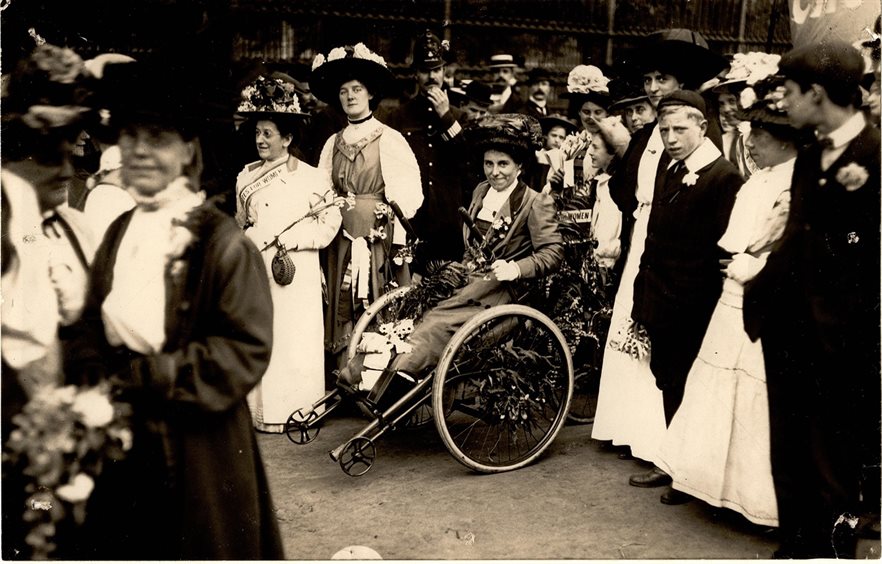The ‘suffragettes’ (campaigners for votes for women) have been back in the headlines during November 2023 when modern day protesters attacked the glass panel protecting the National Gallery’s painting ‘The Toilet of Venus’ by Diego Velázquez with safety hammers. The painting was previously targeted in 1914 with a meat chopper by suffragette Mary Richardson who was protesting against the arrest of Emmeline Pankhurst.
A brief description of Mary Richardson along with other women can be found in the document ‘Suffragists: Descriptions and photographs, 1914’ which can be found in the online collection ‘Women in the National Archives’ together with many other documents relating to the actions of the suffragettes and their sometimes harsh and even brutal treatment at the hands of the authorities.

Rosa May Billinghurst on a Suffragette march, using "the machine". From the LSE's Women's Library collection on Flickr.
One such account from the document ‘Suffragettes: complaints against police (1911)’ is by Rosa May Billinghurst who had had polio as a child and used walking aids throughout her life. She had attended a protest using a hand propelled tricycle (which she refers to as ‘the machine’) because she was, as she describes herself, ‘lame.’
At first, the police threw me out of the machine on to the ground in a very brutal manner. Secondly, when on the machine again, they tried to push me along with my arms twisted behind me in a very painful position, with one of my fingers bent right back, which caused me great agony. Thirdly, they took me down a side road and left me in the middle of a hooligan crowd, first taking all the valves out the wheels and pocketing them, so that I could not move the machine...
Fortunately for Rosa May the ‘hooligan crowd’ on this occasion turned out be friendly, but Rosa May goes on to describe other instances when the police deliberately damaged her machine or encouraged passers-by to do so.
The name Rosa Billinghurst appears in a summary of a court trial reported in the Manchester Guardian of 13 March 1912. Here, she is described as ‘a cripple charged with breaking windows in Henrietta Street’ but the police are said to have been ‘always unwilling to arrest her…and sought rather to place her in safety.’
Extracts from recently digitised collections such as ‘Women in the National Archives’ and various historic daily newspapers give glimpses of not only of how women and disabled people took part in historical events, but also show how language and terminology has changed over time. The extract about Rosa Billinghurst only comes up if you already know Rosa’s name and are looking for her. Anyone researching ‘disability’ in the National Archives would not easily find it due the way records are indexed in a way that makes disabilities and differences invisible.
This means that to find certain social groups when searching primary sources such as reports of court cases and eyewitness accounts without knowing individual names, it might be necessary to use search terms we now might feel uncomfortable with.